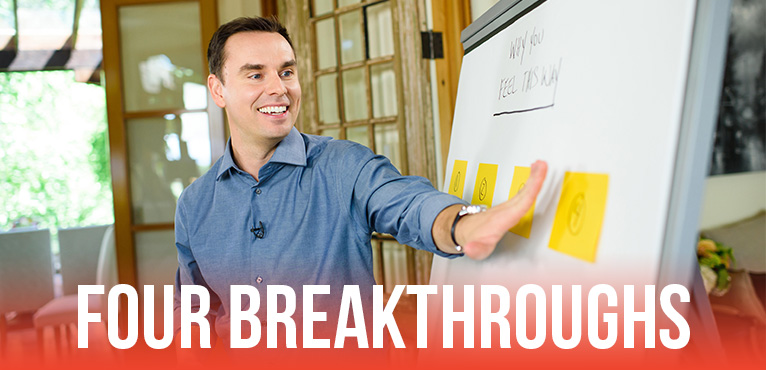SUMMARY
- “Your job is to manage your own state of being in conflict situations.”
- Looking for ways to improve your relationships? Learn these simple strategies to bring your relationships balance, peace, and harmony.
- “The better you learn to manage yourself, the better your relationships will be.”
- Watch the video to get the full training.
- If you’re finding yourself constantly fighting with those you care about, consider these four practical steps on how to strengthen your communication skills, center yourself in the midst of conflict, and ultimately build healthy, vibrant relationships with those in your life.
- To begin practicing these prompts to manage conflict, complete the worksheet for this training here.
- Already have the High Performance Planner and CRUSHING each and every day? Let’s celebrate you! Take a photo with your planner and use #HPXlife or #TeamHPX.
HOT NEWS & DEALS!
-
Free Book!
My blog readers get a complimentary copy of my new book High Performance Habits, while supplies last! I bought 1000 for you – so no charge for the book itself – but I do ask you pay your shipping. While supplies last. Get yours here.
-
8 Online Courses for $10!
My blog readers also get an exclusive $10 trial to access ALL my personal development courses! Click here for the $10 trial. Students call it “the Netflix of Personal Development.” You’ll call it the curriculum that changed your life forever!
-
High Performance Planner!
This is the 2-in-1 planner and journal achievers use to win the day and accelerate long-term success. Get yours here (while supplies last)!
DID YOU KNOW?
I give weekly prizes, gratitude and shout-outs to our students, so post a screenshot or video on Instagram and use #TheBrendonShow! I can’t wait to hear your thoughts about this episode!
RELATED POSTS
When People Don’t Support You
Nurturing Great Relationships
How to Wind Down
When You’re Angry All the Time
Creating Relationship Boundaries
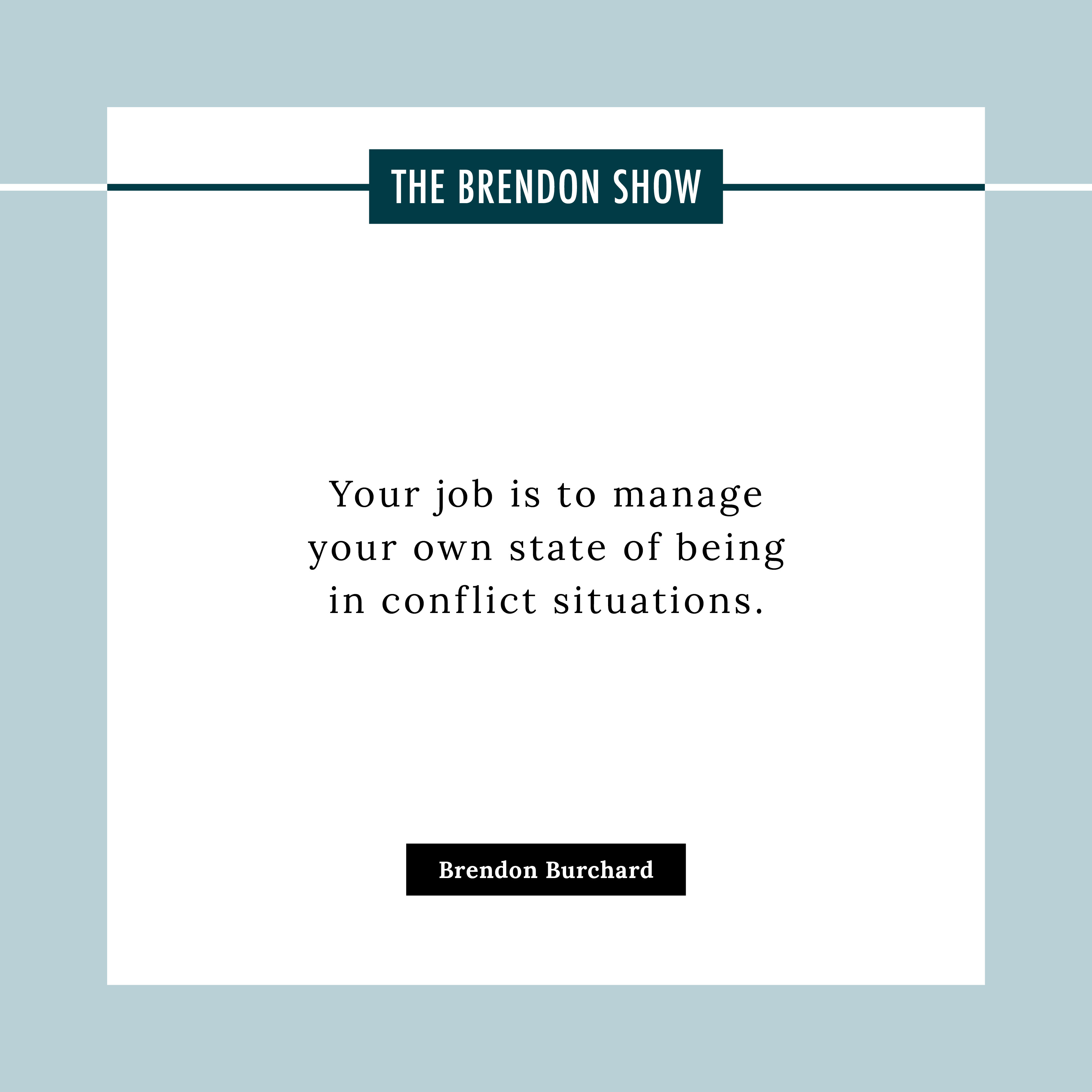
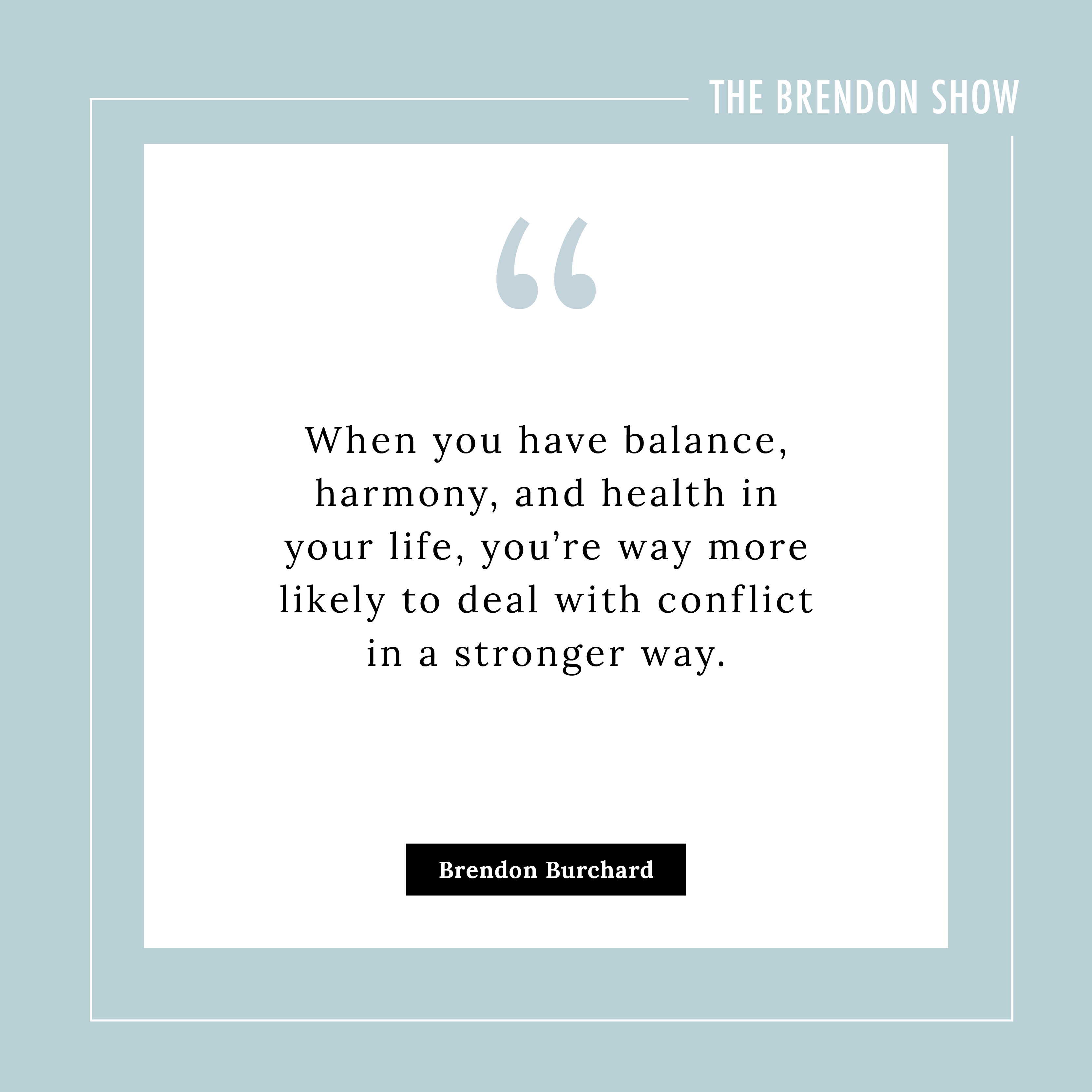
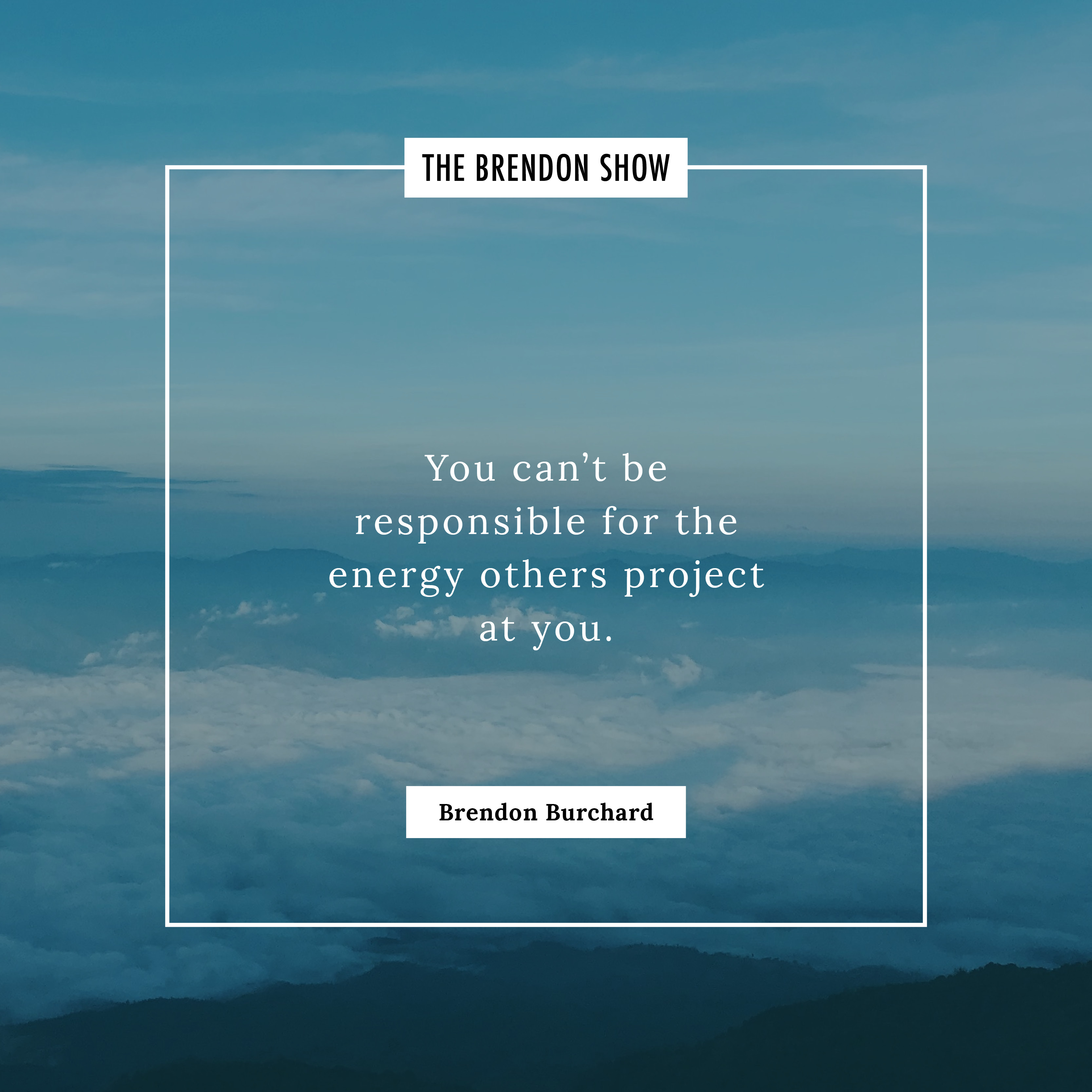
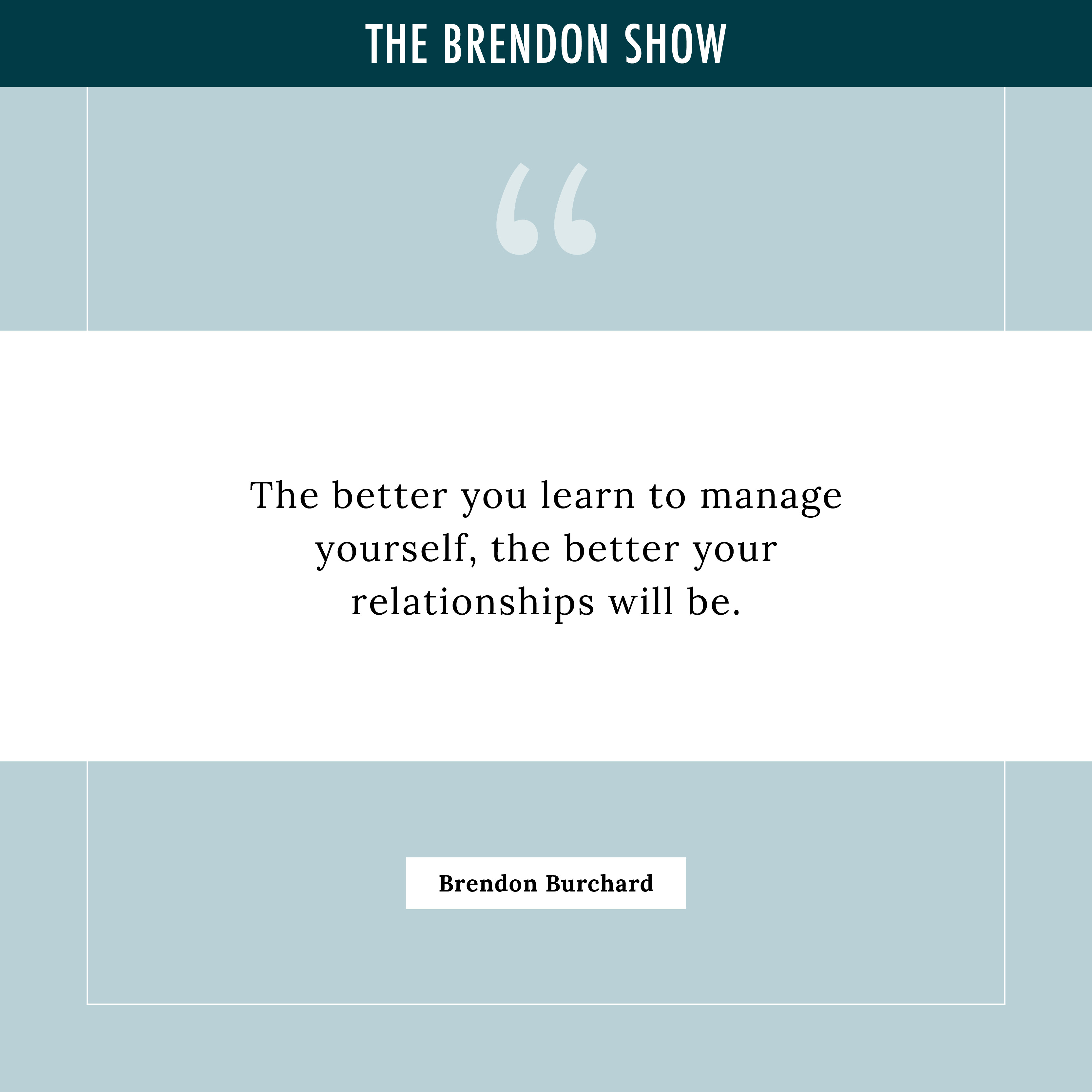
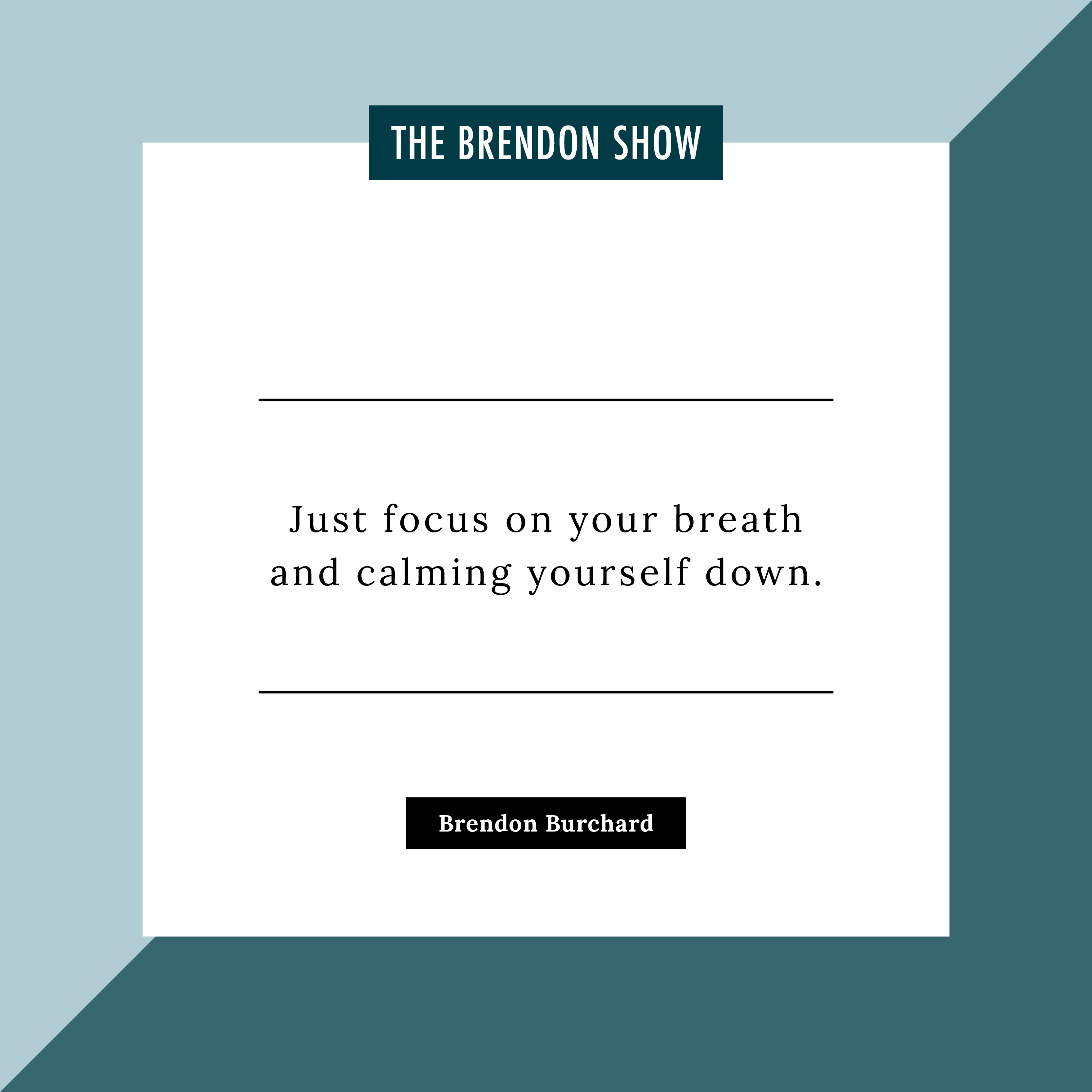
FULL TRANSCRIPT
[The following is the full transcript of this episode of The Brendon Show. Please note that this episode, like all TBS episodes, features Brendon speaking extemporaneously–he is unscripted and unedited. Filmed in one take, The Brendon Show has become one of the most viewed unscripted, direct-to-camera self-help series in the history of YouTube. It has also been the #1 Podcast in all of iTunes and is regularly in the top podcasts in Self-Help and Health categories around the globe. Subscribe to the free motivational podcast on iTunes or Stitcher.)
“Brendon, why am I always fighting with the people I love?”
I get this question all the time, “I keep fighting with my spouse, I keep fighting with my girlfriend or my boyfriend, I fight with my friends, I keep getting enrolled in these conflicts and I can’t get myself out.” All the sudden you’re in this drama circle that is always going. There’s always a fight, always a blow-up, always a challenge. And then you’re just in fight repair and it’s exhausting when you’re in that conflict circle that never ends.
So, let me share with you four ideas of what you can do in your relationships to end that drama, or at least better adapt and deal with all of the fighting.
1. Eliminate the Ongoing Stress
The first thing to realize when people ask, “Why am I always fighting?” is if you have ongoing stress, fatigue, and overwhelm in your life, do not be surprised when that shows up in your relationships as an argument. What a lot of people don’t realize is that the things that wouldn’t usually bother you, they really bother you when you’re tired, they really bother you when you have so much on your plate, they really bother you when your shoulders are weighed down with obligations and responsibilities. It’s one of the reasons I’m always telling people to please read my book, High Performance Habits, so you can learn to get more harmony in your life. When your physiology is off, when you carry around stress for weeks, months, and years, of course you’re more likely to pop, right? It’s like the steam entering the pipe and there’s no outlet. One day just a simple tap on that pipe and it bursts and that’s what happens. You’re in a situation where you have chronic levels of stress and fatigue and then somebody just barely hits your pet peeve and you’re like, “Rah!”
You have to realize that if you allow yourself to keep carrying stress, to keep doing things that draw you into mental fatigue or physical exhaustion, do not be surprised that you’re getting in more fights with people.
And you can’t just blame other people. You have to say, “Okay, what am I doing to stress myself out consistently? What am I doing to cause mental fatigue? What am I doing to not take care of my body?”
When you have balance, harmony, and health in your life, you’re way more likely to deal with conflict in a stronger way.
When you feel like crap, you treat people like crap. Isn’t that true? So, number one, dial in the balance in your life. I know tons of people say, “Well Brendon, balance is impossible.” They think that work-life balance or balance in life is not achievable. But I’m here to say if you’ve given up and said, “Balance is never possible,” maybe you need to reconstruct how you think of balance.
A lot of people think of balance in terms of hours (“I should spend this many hours with my family every single day, this many hours with my work, and this many hours on my hobbies”). Their expectations of complete balance by the hours never comes to fruition, right? Instead, what if you sought to seek balance not in terms of hours, but in terms of harmony and happiness? There’s times in my life where I’m very balanced. I’m spending a ton of time with family and not as much at work as I’d like to, or sometimes way too much work and not as much with family. But I’ve consciously chosen this, and I’ve scheduled it this way so that I feel less stressed.
It’s when your agenda is other people’s agenda in life that all of a sudden you feel this ongoing stress. You keep letting distractions make you mentally fatigued. You’re going to get to a point where it’s chronic stress and chronic fatigue.
I don’t use the word chronic lightly. I’m very well-educated about what that means in terms of our psychology and physiology. It’s real and I don’t want you to get there. And so if you are already there, please take care of yourself. If you feel yourself heading there, just be aware. A lot of your fights and arguments are coming from how you feel in the moment that you’ve been dragging along with you for a long time. Once you recognize that and you get yourself in a better state in terms of your own harmony and health, you’ll deal with the storms much better in life.
2. Know Your Triggers
Second big idea is to know your triggers. You have to know the things that hook you. The mental and emotional triggers that other people hit that cause you to want to engage in a fight. Somebody can say something so simple and innocent that outside observers would think, “What’s the big deal?” But it throws you into a rage because that for you is a hot-button issue.
A good practice for you to do is sit down with your spouse, your significant other, or your partner. Sit them down and go, “You know what? These are the things that tend to make me freak out,” and it’s not their responsibility to avoid all those all the time, but if they’re aware of them, they can bring them up in a better way. If they’re aware of them, they can avoid them when you’re not feeling good. If they’re aware of them, they can learn to work with you through that. But if you’re unaware of your own triggers and they’re unaware of their triggers, then guess what? You can be having a great conversation and all of the sudden, something tiny happens and bam! It’s this huge fight. Have you ever done that? Where you’re like, “Why are we fighting about this?” Have you ever had an hour-long fight and thought, “That was stupid! Why did we do that?” You did it because both of you were unclear about each other’s emotional triggers.
People carry triggers from their childhood a lot. They were ignored when they were a kid and now when someone ignores them in a conversation, they freak out. Or they grew up in a family where interruption was allowed and now they’re in conversation with somebody where interruptions aren’t allowed and that’s a trigger for that other person who’s never had it before and you’re used to it. “How dare you interrupt me?” Interruption is a trigger, disrespect is a trigger, a certain tone can be a trigger, a certain topic can be a trigger, and you need to know what these are for you.
So, what I encourage you to do is look back at your last ten or twenty big fights that you’ve had with other people. And when I say big fights, it doesn’t mean you had to scream and yell and holler. It means an incredibly uncomfortable and disheartening argument where you felt terrible and likely they felt terrible. When I say a big fight that means something different for everybody, doesn’t it? Well, so are triggers.
It’s different for everybody. For me, a trigger is if you said something to me once or twice, and on the third time you don’t do that. I know that’s a trigger for me because integrity, consistency, and congruence are big deals where I grew up and how I grew up. It’s like if somebody said something and they didn’t do it, where I grew up, with the household I grew up in, and the people I grew up with…oh, they’d get in trouble. So, for me, it’s a big trigger if someone says they’re going to do something and they say it over and over and over and I find out they didn’t. I’m freaking out. But I know that’s a trigger for me and I know that I have an unproductive response to that so when it does happen, I move on to number three.
3. Breathe and Hold
Number three, you’ve got to teach yourself to breathe and hold, and here’s what I mean by that. When a trigger is hit or someone’s trying to engage with you, your job is to learn to breathe and hold your comments, hold your judgment, hold your need to be right, to argue, to make your point. When you’re triggered and emotionally there, it’s like that steam pipe about to burst. You’ve got to breathe through it, man. You’ve got to calm yourself down. You’ve got to just let them engage and let them blow out. You know it’s the dragon that’s about to run out of steam. Let the dragon blow it’s air out, hold a solid place, be present, be open, be aware, but don’t feel like you need to win the argument when somebody’s super heated. Your best bet when you feel super heated or somebody else is super heated is to breathe and hold. Just focus on your breath and calming yourself down. Just keep breathing in through the nose, out through the mouth, nice and deep and just kind of engage. Don’t try to argue, don’t try to fight. Just breathe and hold, be aware of what they’re saying and hold your tongue until you are ready to speak.
Here’s the thing, most often arguments really escalate because people are trying to win many arguments within the argument, right? Instead, what I would suggest you do is let someone make all their arguments. Like literally let them blow out all their fire, let them say everything that you have to say and you listen and you acknowledge. You validate if it’s true, if you agree with it. But when you don’t agree with it, don’t feel like you have to jump in there. Let them get it all out and as they’ve shared it all, breathe through it and then say, “Okay. I heard what you said. It sounds like these things are important to you” and validate and reflect back to them the things that are important to them. Start there, meet them where they’re at before you try to make your case.
Be like, “Okay, I can see this means something really important to you. I heard you. You said these three things, am I right?” People are completely disarmed when you do that because what most people do is they fight point by point but guess what? One person loses, one person wins, and everyone feels not validated and the fight keeps escalating. Have you ever been in a fight where people keep bringing up stuff? And you’re like, “Wait. Well, we just resolved this thing, where did this thing come from?” You know where that came from? They didn’t feel validated yet. Even if they won the argument, they’re going to throw more in this fire because they’re waiting for you to validate. And I know you’re going to say, “Well Brendon, they’re unreasonable. I shouldn’t have to validate them.” I’m not saying that you tell them you agree. I am suggesting that you reflect back to them what’s important to them so they feel validated and heard because when something doesn’t feel heard, guess what? Their mouth keeps running. So once you realize that they’re throwing in more fuel to the fire, that means that they must not feel heard, validated, respected or part of this conversation. Let them blow out that air, sit there and just wait. Validate by saying, “I heard you say this is important, this is important, this is important, okay great. Can I share with you what I think about that?” And then you get to make your case and just address one point. Say, “I don’t know if that’s important to both of us.” Address another point, “I know that’s both important to both of us” and share your point. By doing this, you will be more mature through the process. I’m not saying you’re going to win or lose more fights doing that. I’m here to say that you getting a hold of your breath, getting centered, you caring about listening, those things almost never go wrong in an argument.
What usually goes wrong in the argument is you just react and you say something that was too much and too fast during a big fight and you don’t realize that you’re actually helping it escalate. Now, obviously at this point, I know people are going to be commenting, “But Brendon, this person’s a son of a gun. You don’t understand this person.” And I’m here to tell you, don’t miss the universality of these messages to you because it is not your job to control the other person.
Your job is to manage your own state of being in conflict situations when they happen because they’ll always happen. There’s going to be more conflict in your life. There’s going to be more fights. Your job is to manage yourself.
It’s that old thing, “Please be responsible for the energy you are projecting into this world.”
You can’t be responsible for the energy they’re projecting at you.
So you have to meet them where they are at and you’ve got to manage yourself. The better you learn to manage yourself, the better that relationship goes.
4. Challenge Yourself to Be the Generous One
I also want to share this fourth big idea with you. I know if you’re dealing with a real son of a gun, you’re going to be like, “All right Brendon.” But listen, I ask that in conflicts and in fighting situations for you to challenge yourself to be the generous one. And what does that mean in a fight? Being generous means breathing and holding and letting them go first. Being generous gives them the benefit of the doubt. Being generous says, “Maybe they think this way.” Being generous means you don’t have to feel like you need to win immediately. And for me in conflicts, I’m just generous with the other person. I assume there’s a reason they have that viewpoint. I’m generous with the person. Give them what they need. Just understand that you know this is maybe important to them and it’s not important to me and okay here you go.
And I’m telling you that I don’t always get this right. In fact, I’m sure my wife could tell you that I screw up on a lot of these things. I’m often known as being the passionate person in almost all my relationships, right? So in an argument I can be very passionate, very intense, very fired up, very focused, very logical. I suck to be an argument with. But when people allow me to do my style and not try to correct my style, they’re being generous with me. When I’m in an argument and I allow you to do your style of argument, that’s being generous. What most people screw up—and the reason fights escalate—is they get off topic. They get off what the needs are, and what they do is they start pointing and blaming, “You shouldn’t do your style, I hate your style” and now they’re talking about conflict styles versus what are we trying to figure out together. Because real fights tend to end faster when both people realize, “Oh, we’re actually together. We have different styles and we need to work on this problem together with our different styles.”
The opposite of generosity is trying to close somebody down for their style being wrong.
And I know this is tough, you know there’s a lot of relationships in my life where I’m the passionate one and somebody else might be quieter. Or I’m the person who’s very logical in these moments and sometimes when I’m thinking, my eyes furrow like this and I look like I’m disapproving of you but really, this is me just thinking. And people go, “Brendon you’re so disapproving.” I’m like, “I’m thinking over here, dude. I’m sorry, I got to fix these things.”
So you have to know that other people have different styles and when you let other people have their own ideas, their own voice, you are valuing the relationship more than any person being completely right. And once you accept that and anticipate that, you’re generous with trying to meet in the middle and caring for and respecting each other.
Obviously, these are just ideas about how you might be able to improve the fights that you have. If you’d like some more tips on how to have good relationships, make sure you check out my YouTube channel. Just type in my name, type in relationships, I’m sure a bunch of videos will come up for you. We talk about this topic quite a bit. I appreciate you watching this one. I know it can hook. I know there’s probably a lot of emotional triggers happening in your own life as I’m talking about this and you’re already thinking about somebody you’re mad at. I hope that you’ll revisit this and learn to breathe and hold and be generous and improve your relationships because at the end of our lives, the quality of our life is reflected by how we felt the quality of our relationships were. So if we can handle this one part a little better moving forward, I think you’ll feel much more like you really lived, you really loved, and you really made a difference.


